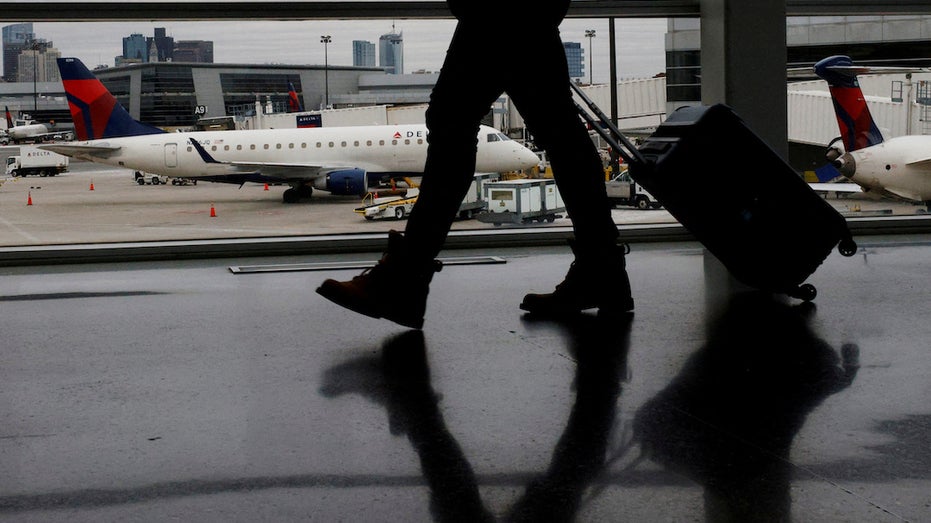Airline trade group requests meeting with FAA to discuss air traffic controller staffing challenges
Airlines for America represents major airlines including United, Delta, JetBlue and Southwest
Travel turmoil ahead of the holiday weekend
FOX Business' Lydia Hu reports on flight cancelations ahead of the busy July 4 holiday.
Airlines for America, a trade group representing major airlines including United, Delta, JetBlue and Southwest, sent a letter to Transportation Secretary Pete Buttigieg requesting a meeting with the Federal Aviation Administration to discuss staffing of air traffic controllers for the July 4th holiday and summer travel season.
Airlines for America CEO Nicholas Calio wrote that U.S. air carriers have implemented several initiatives to "drive better operational reliability," including dropping 15% of flights planned for June through August, accelerating hiring and training programs for flight crew and customer service agents and giving passengers more flexibility to change their travel plans.

FILE PHOTO: A passenger walks past a Delta Airlines plane at a gate at Logan International Airport in Boston, Massachusetts, U.S., January 3, 2022. (REUTERS/Brian Snyder/File Photo / Reuters)
While Calio said that the airline industry is "actively and nimbly doing everything possible to create a positive customer experience", he argues that "not every air traffic variable is within an airline’s control."
"For instance, one of our A4A member carriers estimate that air traffic control (ATC) related issues were a factor in at least one-third of recent cancellations," he noted. "In many instances the weather requires the Federal Aviation Administration (FAA) to institute Ground Delay Programs (GDP) or other traffic management initiatives that slow the ATC system for many hours. However, we have also observed that FAA ATC staffing challenges have led to traffic restrictions under blue sky conditions."
UNITED AIRLINES' PILOTS UNION APPROVES TENTATIVE DEAL TO BOOST PAY FOR 14,000 PILOTS
A4A has asked the FAA to share its air traffic controller staffing plan for the July 4th holiday weekend. It also wants to ensure adequate staffing is available at key FAA facilities, such as the Jacksonville Center in Florida, which the letter said has been understaffed for 27 of the last 30 days, and New York's Terminal Radar Approach Control Facility (TRACON).
In addition, the letter calls for a reduction in airspace closures due to commercial space launches, more "optimal scheduling" of airspace closures to avoid high-volume air traffic times, establishing a real-time scheduling and management tool for special activity airspace being utilized by the Department of Defense and developing a policy regarding unscheduled operations to help guide planning efforts.

FAA Air Traffic Controllers work in the Dulles International Airport Air Traffic Control Tower in Sterling, Va., Tuesday, Sept. 27, 2016. ((AP Photo/Cliff Owen))
"Our nation’s air traffic controllers have done exemplary work during the pandemic in managing traffic safely and efficiently," Calio added. "We want to make certain that they have all the resources and tools needed to be successful."
TEXAS HIGH SCHOOL'S FLIGHT LESSONS MAY HELP SOLVE PILOT SHORTAGE
An FAA spokesperson told FOX Business that the agency has acted on the issues raised in the letter by adding alternate routes, placing more controllers in high-demand areas and increasing data sharing. In addition, the agency said there would be no space launches occurring during the Fourth of July holiday.
"People expect when they buy an airline ticket that they’ll get where they need to go safely, efficiently, reliably and affordably. After receiving $54 billion in pandemic relief to help save the airlines from mass layoffs and bankruptcy, the American people deserve to have their expectations met," the spokesperson added. "Airlines are well aware of these measures, as their representatives sit next to FAA staff at our Command Center and participate in calls with our personnel every other hour."
The FAA said it appreciates the airlines' initial steps and that it looks forward to "continuing down a collaborative path focused on solutions to ensure airlines and the entire aviation system are able to meet passengers’ expectations."
CLICK HERE TO READ MORE ON FOX BUSINESS
AAA is predicting that 47.9 million people will travel 50 miles or more from home over the July 4th holiday weekend, up 3.7% compared to 2021 and just shy of 2019 levels. Despite soaring gas prices, a record 42 million people are expected to travel by car, compared to 3.55 million people traveling by air and 2.42 million people traveling by bus, train or cruise.





















